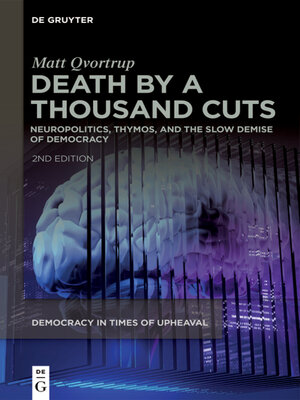Death by a Thousand Cuts
ebook ∣ Neuropolitics, Thymos, and the Slow Demise of Democracy · Democracy in Times of Upheaval
By Matt Qvortrup

Sign up to save your library
With an OverDrive account, you can save your favorite libraries for at-a-glance information about availability. Find out more about OverDrive accounts.
Find this title in Libby, the library reading app by OverDrive.



Search for a digital library with this title
Title found at these libraries:
| Library Name | Distance |
|---|---|
| Loading... |
In this new edition of Matt Qvortrup's acclaimed book, the author shows how neuroscience can help us understand why people willingly give up their democratic rights or are unwillingly forced to do so.
According to Plato, democracies die when people get angry. Resentment causes them to vote for demagogues. Recently, democratically elected politicians have used crises as a pretext for dismantling democracy, following a pattern we have seen since the dawn of civilization. Why do people fall for the lure of dictatorships? And what can we learn from the cause and effects of dictatorships to understand why democracies die?
Death by a Thousand Cuts: Neuropolitics, Thymos, and the Slow Demise of Democracy is written in an accessible style with vignettes and new empirical data to provide historical context and neurological evidence on a much-discussed topic: the threat of democracy. This book will help readers who are concerned about the longevity of democracy understand when and why democracy is in danger of collapsing and alert them to the warning signs of its demise.
According to Plato, democracies die when people get angry. Resentment causes them to vote for demagogues. Recently, democratically elected politicians have used crises as a pretext for dismantling democracy, following a pattern we have seen since the dawn of civilization. Why do people fall for the lure of dictatorships? And what can we learn from the cause and effects of dictatorships to understand why democracies die?
Death by a Thousand Cuts: Neuropolitics, Thymos, and the Slow Demise of Democracy is written in an accessible style with vignettes and new empirical data to provide historical context and neurological evidence on a much-discussed topic: the threat of democracy. This book will help readers who are concerned about the longevity of democracy understand when and why democracy is in danger of collapsing and alert them to the warning signs of its demise.







